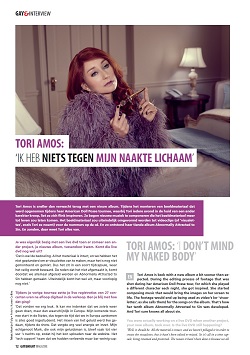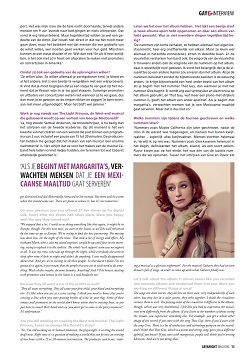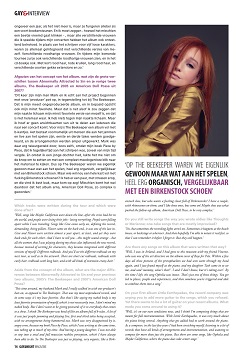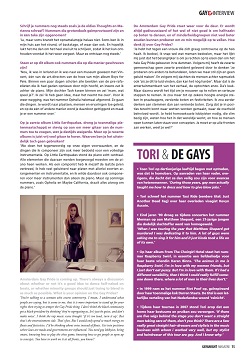|

songs | interviews | photos | tours | boots | press releases | timeline
Gay & Night (the Netherlands)
June 2009 (number 136)
TORI AMOS: 'I DON'T MIND MY NAKED BODY'
Tori Amos is back with a new album a bit sooner than expected. During the editing process of footage that was shot during her American Doll Posse tour, for which she played a different character each night, she got inspired. She started composing music that would bring the images on her screen to life. The footage would end up being used as videos (or 'visualettes', as she calls them) for the songs on the album. That's how her tenth album Abnormally Attracted to Sin was developed. And Tori sure knows all about sin.
You were actually working on a live DVD when another project, your new album, took over. Is the live DVD still happening?
'Well, it should be. All the material is intact, and we haven't pillaged it in order to create the visualettes, but it hasn't been edited or mixed. So it's all in a time capsule, being retained and protected. The reason it hasn't been done is because we all got distracted and did Abnormally Attracted to Sin instead. But there will be a time when this should come out. There are plans to release it, but it's not tomorrow.'
On your previous tour you offered 27 live shows up for digital sale, hours after the shows had taken place. Were you happy with the way they turned out?
'We enjoyed that a lot. I could see us doing something like that again, it might be in Europe, though. For this next tour, we start in the States, so we'll be well rehearsed by the time we get to Europe. We're trying to find the best partnering. The mixing was done live, on the night of the show. That took a lot of energy and effort. My husband Mark, who is also my sound engineer, would be up until four in the morning, trying to upload it to the website. The whole 'tech support' team was no support at all. It was my crew, who was up through the night, while everybody else went to sleep after nine o'clock at night and didn't do anything. I was really disappointed about that. And yet, we're cutting in all these people. So that doesn't mean I'm not gonna do it again, it just means that the people that you cut in with need to do something. Wash clothes maybe, do some laundry. Anything! And I' ll be honest, dealing with promoters and venues in the States is a real headache too.'
Because they all want a cut of the profits as well?
'They all want everything. They all want your first child, your blood and everything
else. It's like when you are at a wine tasting. I think you need to know that you're
crossing a line when you start putting bottles of wine in your bag. Some of these
venues and promoters in the world don't know when they're crossing lines, so you
just have to smack their hand and say 'you don't get to come to the party anymore!'.
It's unfortunate.'
Are you still working on creating the West-end musical, The Light
Princess, based on George MacDonald's story?
'Yes, I'm still working on it! Samuel Anderson, the playwright, is writing the second draft now. Right now it's a question of making a world that can fit into an evening of two hours with a 15 or 20-minute intermission. The producers said to me, 'making a musical is a glorious nightmare'. For the musical Cabaret they had written drawers full of songs, in order to come up with what Cabaret finally was.'
Let's talk about the album. It almost seems like you recorded two separate albums and condensed them into one. Were you working on different things at once?
The songs are short stories, they all live on their own, very independently of each other, but they live in a solar system, they orbit together. I think the visualettes connect them as well. The playing order of the visualettes is different to the album, though, which was very intentional. I felt like you had to experience the visualettes very differently from the album. If you listen to the numbers without seeing
the visuals, you experience something else. For example, you get a whole other image of the record if you start with the song Th at Guy, then if you' d start with the song Give. There is a lot of synthesizer and technology going on on the record, and I think that Th at Guy, which is a piano and strings song, gives you a different apéritif, you know? If you start with margaritas, people will think you're serving Mexican. And we're not doing that.'
Which tracks were written during the tour and which were done after?
'Well, songs like Maybe California were down the line, after the crisis had hit in the world, and people were losing their jobs - losing everything. People were falling apart while I was traveling. Songs like Give came early on, defining the record, demanding, being pillars. Flavor came on the back end, it was one of the last in. Give and Flavor were written almost a year apart, at least, and yet they were book ends for each other. And I have to tell you - this might sound strange - but all the women that I was playing during my shows also influenced the new record, because instead of writing for characters, they became integrated with different versions of myself. Different redheads. And you'll see the different redheads on my next tour, as well as in the artwork. There are short cut redheads, redheads with curly hair, redheads with long hair, and with all kinds of extension-crazy-hair.'
Aside from the concept of the album, what are the major differences
between Abnormally Attracted to Sin and your previous
two albums, 2005's The Beekeeper and 2007's American Doll
Posse?
'This time around, my husband Mark and I really walked in with our producer's
hats on, as opposed to The Beekeeper. That was my most unproduced record, and
in some ways it's my least favorite. But that's like saying my naked body is my
least favorite presentation of myself, which is not necessarily true. I don't mind my
naked body. But I don't want to be giving postcards of it to everybody that comes
to a show. I think The Beekeeper was kind of like an album full of b-sides. A lot of
it was just people jamming and playing live, first and third takes being accepted,
with no arrangements being hammered out. Mark was very disappointed by it,
angry even, because my book Piece by Piece, which I was writing at the same time,
was taking up so much of my time. And having a young daughter, I was not able
to step into a total and full musician ruthless perception, which I have always
been able to do. So The Beekeeper was just us playing, very organic, like a Birkenstock shoe, but who wants a fucking closet full of Birkenstocks? I have a couple,
with rhinestones on them, and I like those ones, but come on! Maybe that was what
pushed the follow-up album, American Doll Posse, to be very complex.'
Do you still write songs the way you wrote oldies like Thoughts
or Marianne; one-take songs that are mostly improvised?
'Yes, but sometimes the recording lights aren't on. Sometimes it happens at the beach
house, or backstage or wherever. And then hopefully I'm able to notate it real fast, so
that I can remember it before I forget it. But they still happen.'
Are there any songs on this album that were written that way?
'Well, I was in Ireland, and I had gone to this museum with my friend Vincent,
who was one of the art directors on the album cover of Boys for Pele. Within a few
days all these pictures of the preraphaelites we had seen went through my head
again, and I just found myself at the piano, and my daughter Tash came in to see
me, and said 'mommy, what's that?'. I said 'I don't know, but it's taking over'. By
the time I left, the song Ophelia was intact. That's just one of those things. You get
led to places, people and experiences, and then somehow you're triggered and able
to combine them into a song.'
On your first album Little Earthquakes, the record company was
urging you to add more guitar to the songs, which you refused.
Yet there seems to be a lot of guitar on your recent albums. What
made you come around to using it?
'Well, it's on our own conditions now, and I think I'm composing things that are
meant for full instrumentation. With Little Earthquakes, it was very much about
the piano being central. Anything that got added had to work around the piano.
As a composer, in the last few years I had been stretching myself, listening to a lot of
records that have all kinds of arrangements and instrumentation, and wanting to
compose for more than just the piano. But there are some songs, like Ophelia and
Maybe California, where the piano does take center stage.'
Amsterdam Gay Pride is coming up. There's always a discussion
about whether or not it's a good idea to dance half-naked on
boats, or whether minority groups should just trying to blend in
as much as possible. What is your opinion on the Gay Prides?
'You're talking to a woman who courts controversy. I mean, I understand what
people are saying, but it seems to me, that it is more important to stand up for your
rights then trying to temper the Gay Pride thing. I don't think the black community
got a black president by thinking 'they're segregating us, let's just be quiet, and don't
make noise'. I think the rap music scene thought 'if it's too loud, turn it up'. But
that's the entertainment side. That's fun. But I would only spend so much energy on
fl oats and festivities. I'd be thinking about votes instead of floats. Get into positions
where laws are made and governments are influenced. You need gay lobbyists, being
smart, knowing how to play the chess game, knowing how to get people to open up
to concepts. You have to work on it at all fronts, you know?'
original article
 
 
t o r i p h o r i a
tori amos digital archive
yessaid.com
|